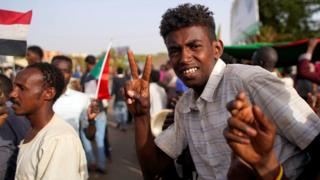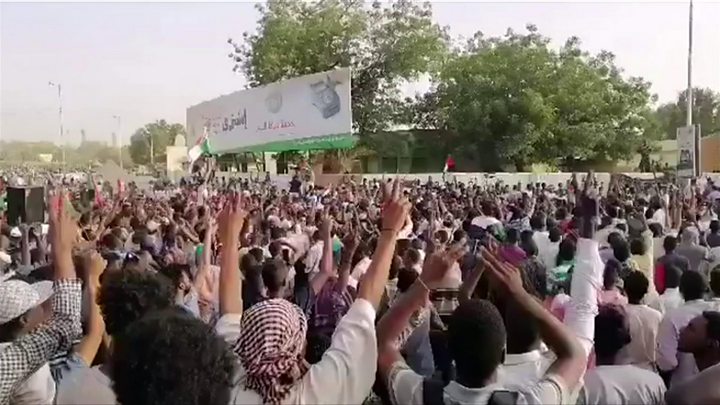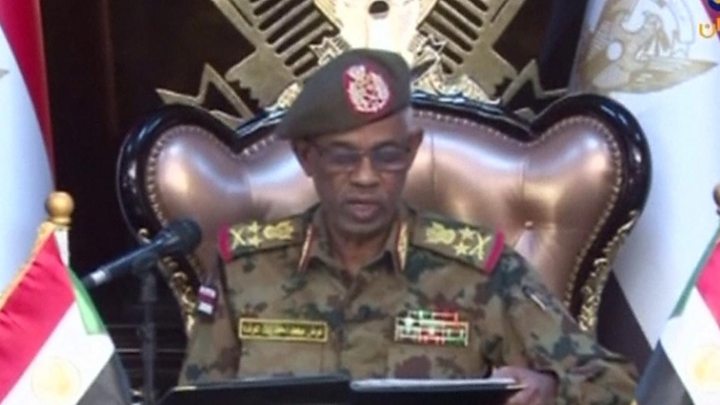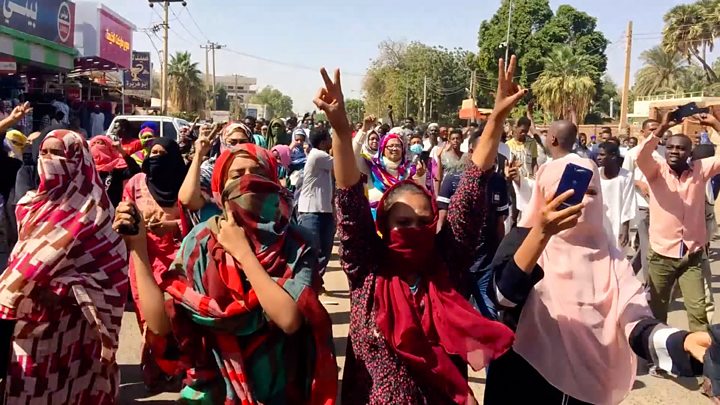Sudan military reaches out to protesters
The military leaders who carried out a coup in Sudan on Thursday have sought to reassure people that their only concern is public order.
A spokesman said Sudan’s future would be decided by the protesters who took to the streets to demand President Omar al-Bashir’s removal.
But protesters remain camped out in the streets of Khartoum, fearing the coup leaders are too close to Mr Bashir.
The military says it will not extradite him on war crimes charges.
Mr Bashir is the subject of two international arrest warrants issued by the International Criminal Court (ICC), which accuses him of organising war crimes and crimes against humanity in Sudan’s Darfur region between 2003 and 2008.
However, he may be put on trial inside Sudan, according to the military council set up after the coup.
Mr Bashir, one of the world’s longest-serving leaders until he was ousted on Thursday, is now in custody.
His downfall followed months of unrest which began in December over the rising cost of living. At least 38 people have died in the protests.
What are the military offering the protesters?
The army has said it will oversee a transitional period followed by elections. As part of this, it is imposing a three-month state of emergency, with the constitution suspended.
The military council will be in place for a maximum of two years, it says, but could last only a month if the transition to civilian rule is managed smoothly.
Lt-Gen Omar Zain al-Abidin, who heads the military council’s political committee, said on Friday: “The solutions will be devised by those in protest.
“You, the people, will provide the solutions for all economic and political issues. We have come with no ideology, we have come here to maintain order and security to provide the opportunity for the people of Sudan to achieve the change they aspire to.
“We have no ambition to hold the reins of power. We are here to provide an all-inclusive umbrella.
“Our key responsibility is to maintain public order,” he added. “We will have zero tolerance for any misdeed in any corner of the country.”
Why are protesters so wary?
Thousands remained camped out near military headquarters in the capital on Friday, ignoring a curfew declared by the military.
They are demanding a transition to civilian rule before they return home.
The new military council is headed by Defence Minister Awad Ibn Auf, who was previously regarded as being well placed to succeed Mr Bashir.
During the Darfur conflict, he was head of military intelligence. The US imposed sanctions on him in 2007 in relation to his alleged support for militia blamed for atrocities in Darfur.
Sara Abdeljalil, a member of the Sudanese Professionals’ Association (SPA) which has spearheaded the protests, said on Thursday that the new military council was a “continuation of the same regime”.
“So what we need to do is to continue the fight and the peaceful resistance,” she said.
Reacting to the military’s conciliatory statement on Friday, Khartoum resident Tagreed Abdin told the BBC she was not reassured.
“First of all, we don’t know who’s behind the military council,” she said.
“We are used to hearing government double-speak but we need to see if they’re really interested in dialogue and listening to the voices of the people.”
How did Thursday’s coup unfold?
Early on Thursday, military vehicles entered the large compound in Khartoum housing the defence ministry, the army headquarters and Mr Bashir’s personal residence.
State TV and radio interrupted programming and Mr Ibn Auf announced “the toppling of the regime”. He said Mr Bashir was being held “in a secure place” but did not give details.
Mr Ibn Auf said Sudan had been suffering from “poor management, corruption, and an absence of justice” and he apologised “for the killing and violence that took place”.
What is the reaction abroad?
UN Secretary-General António Guterres appealed for “calm and utmost restraint by all” and urged a transition that would meet the “democratic aspirations” of the people. The UN Security Council is to discuss the situation in a closed-door meeting on Friday.
UK Foreign Secretary Jeremy Hunt said that a two-year military council was “not the answer” and called for a “swift move to an inclusive, representative, civilian leadership”.
The African Union condemned the military takeover, saying it was not an appropriate response to the challenges facing Sudan and the aspirations of its people.
Russia, which twice hosted Mr Bashir despite the international travel ban he faced, called for calm.
Have you been taking part in protests? You can share your experiences by emailing [email protected]
Please include a contact number if you are willing to speak to a BBC journalist. You can also contact us in the following ways:
Or use the form below:
If you are happy to be contacted by a BBC journalist please leave a telephone number that we can
contact you on. In some cases a selection of your comments will be published, displaying your name as
you provide it and location, unless you state otherwise. Your contact details will never be published.
When sending us pictures, video or eyewitness accounts at no time should you endanger yourself or others,
take any unnecessary risks or infringe any laws. Please ensure you have read the terms and conditions.
Terms and conditions
The BBC’s Privacy Policy
Source: Read Full Article






